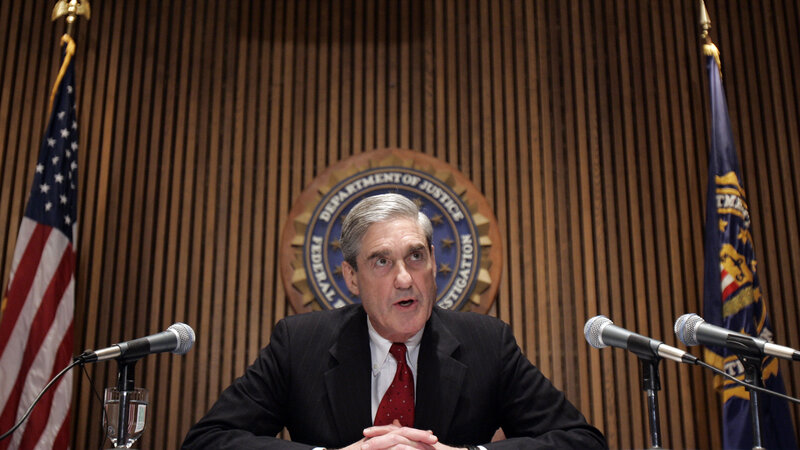Mueller's Reputation In Washington Is 'Stunningly Bipartisan,' Journalist Says
February 1, 2018Heard on Fresh Air

As the investigation into the Trump campaign and Russian interference in the 2016 election forges on, Robert Mueller, the Justice Department special counsel leading the investigation, has managed to stay largely out of public view.
Journalist Garrett Graff says that is in keeping with Mueller's personality: "This is not someone who in any way has tried to grab the spotlight, but instead has kept his head down and worked hard throughout his career."
Graff's 2011 book, The Threat Matrix, explores the transformation of the FBI under Mueller's leadership. Appointed by President George W. Bush, Mueller took over as director of the FBI one week before the Sept. 11 attacks. After Mueller completed his 10-year term as FBI director, President Barack Obama reappointed him for a two-year term, which required a special act of Congress.
"Bob Mueller is probably about as apolitical and nonpartisan a figure as you could find in Washington, particularly at the levels of government in which he has served," Graff says. "This is someone who really, truly believes in truth, justice [and] in the American way, in a way that very few people in American life today anymore do."
Interview Highlights
On Mueller's bipartisan record
We know him most recently, obviously, as the FBI director, but his tenure in government really dates back to the Reagan years. And he's been appointed or held top jobs in the administrations of all five of the last presidents, and was appointed to the Justice Department, the head of the criminal division, under George H.W. Bush's administration, then was appointed a U.S. attorney by Bill Clinton, then appointed the acting deputy attorney general by George W. Bush, and then later FBI director — a position he was reappointed to, in an unprecedented move, by President Obama and confirmed by the U.S. Senate by a vote 100-0, a stunningly bipartisan track record in today's times.
On Mueller's military service
Part of what makes Bob Mueller such a fascinating character is he has dedicated his life sort of time and again to public service. ... Mueller and a handful of other colleagues ... [signed] up for Vietnam after college. This was early in the 1960s, so it was before Vietnam became the cultural touchpoint that it did later.
Second Lt. Marine Corps Bob Mueller ended up leading a platoon in the jungles of Vietnam for a year and really distinguished himself in combat. He received a Bronze Star with valor for his leadership in an ambush that his unit suffered in the fall of 1968, and then was actually shot himself in a separate incident in April 1969 where he received, of course, the Purple Heart and was quickly back on patrol and served out the remainder of his year.
On how the FBI changed after the Sept. 11 attacks
Bob Mueller, in the days after Sept. 11, sees this incredible sea change in the mission of the FBI, which until then for most of its first 90 years had primarily been a law enforcement agency focused domestically on solving crimes after the fact. And on Sept. 11, we saw an international plot that focused on a suicide attack with catastrophic results, and that that necessitated this top-to-bottom change in the way that the United States approached counterterrorism issues, that after-the-fact investigation was going to be inadequate in the face of these threats.
So Mueller was given a mission by [former Attorney General] John Ashcroft and President Bush to not just investigate attacks afterwards, but to stop plots in the first place, to disrupt the attack before it happened.
It led to this massive reorganization that Bob Mueller spent the next 12 years of his tenure working on, to move the FBI from what was traditionally a domestic law enforcement agency into something that is more akin to an international intelligence agency.
On how Mueller's investigation into the Trump campaign is similar to other FBI investigations
This is, in many ways, a perfectly standard and routine FBI investigation. The FBI, as an investigative agency, takes down corrupt organizations, that's what it's designed to do, go after street gangs, drug cartels, organized crime families, and the way that they do that is by starting on the outside and working their way in. And so that can either mean starting at the bottom of an organization, or starting with ancillary charges and working their way inwards, the equivalent of getting Al Capone for tax evasion.
So you've seen this investigation both where Mueller has started almost literally at the bottom with George Papadopoulos and pressured him to cooperate on people above, and also in the charges against Paul Manafort, which are sort of ancillary to the core question of the behavior of the Trump campaign. He's sort of first charged this decade-long alleged money laundering scheme dating back through some sort of unrelated work, again as a pressure point on Paul Manafort and Rick Gates. ...
We speak of the Mueller probe as if it is one thing, but it's actually this whole panoply of different investigations into different threads of the Trump campaign, the 2016 presidential election and the involvement of Russia. There's sort of some money-laundering aspects to it, there's some campaign aspects to it, we've seen him go after and get documents from Facebook, other social media sites, Cambridge Analytica, the campaign data team. There's all sorts of different threads of this investigation that are being followed, and we know that Bob Mueller is going to be incredibly tenacious in that investigation but that he's also not going on a fishing expedition.
On what might happen to the investigation into the Trump campaign if Mueller is fired
This was an investigation that began before Robert Mueller was appointed special counsel. Remember, actually, the guilty pleas of George Papadopoulos and Michael Flynn both stem from lies that they told to FBI agents months before Robert Mueller stepped into this probe.
And so those investigators would presumably continue investigating, and there might even be a new special counsel appointed who steps in, and even if that's not true, and the special counsel's office is disbanded entirely, the prosecution of those open investigations would likely transfer back to the U.S. Attorney's office in D.C. or the U.S. attorney in the Eastern District of Virginia, in Alexandria, Va., and that those investigations might just continue apace absent a special counsel.
People forget, or don't know, when you open an FBI investigation that's actually a very formal process that goes through several different stages of an investigation before you end up with what's known as a "full field" investigation, and by the time you get there, you have to have shown evidence of a potential criminal act in order to get to that formal "OK" to continue an investigation.
And similarly, there's a formal process to shut down an investigation that requires prosecutors to review the evidence with agents and to decline an investigation and charges. This is not something that's quite as simple as, "If Bob Mueller is fired, he walks out the door, locks the office behind him and everything just disappears into the ether."
Sam Briger and Mooj Zadie produced and edited the audio of this interview. Bridget Bentz, Molly Seavy-Nesper and Dana Farrington adapted it for the Web.




No comments:
Post a Comment